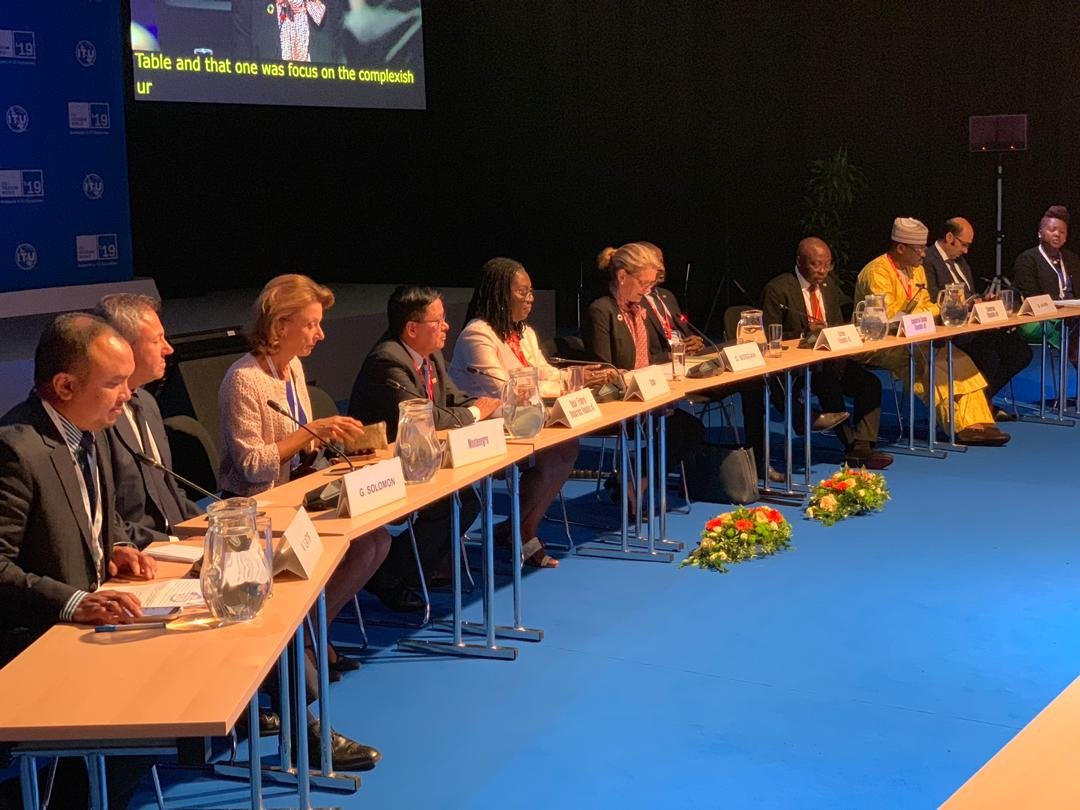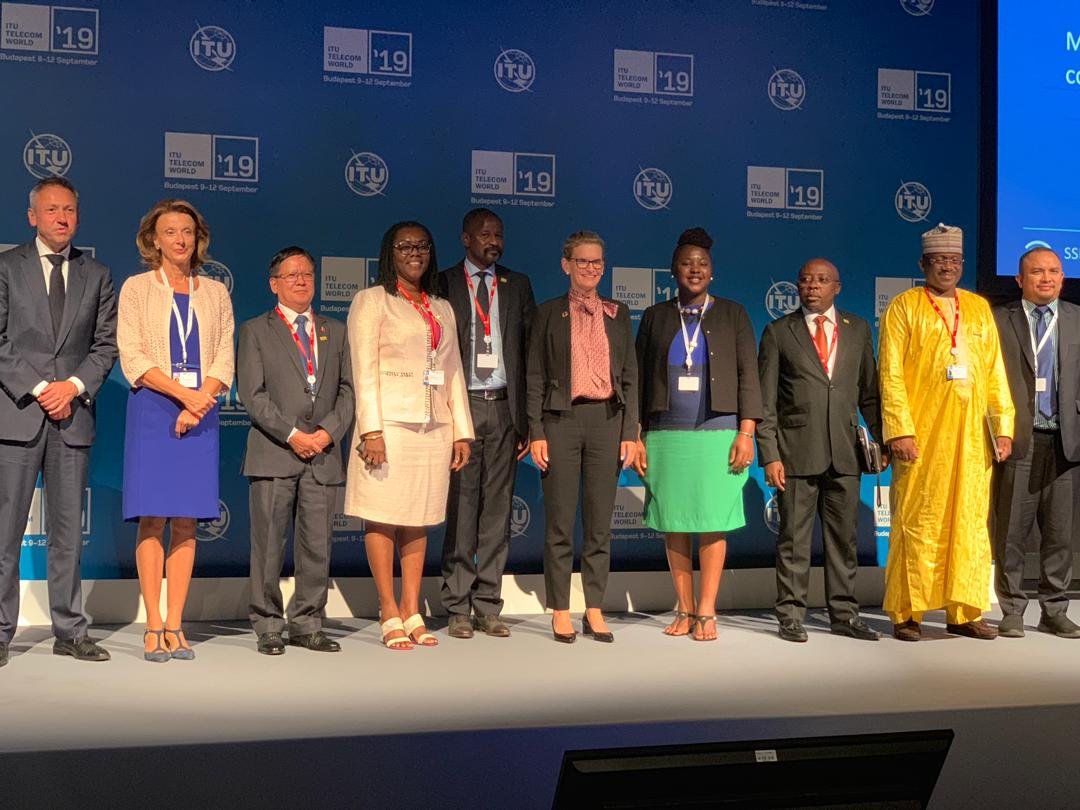Ghana’s Communications Minister, Ursula Owusu-Ekuful, has charged African leaders to equip public servants in their respective country’s with digital skills to manage the continent’s burgeoning ICT space.
According to Ghanaian Communications Minister, Africa is facing a desperate skills shortage in manning its ICT infrastructures thus the need for carefully thought out measure spearheaded African leaders to bridge that the deficit.
“We need to run back the digital skills for all of us particularly,” Mrs Owusu-Ekuful said Tuesday when addressed the Ministerial Roundtable at ITU Telecom World Panel discussion on the theme: Stimulating public-private collaboration on connectivity and adoption.
“I think that is an opportunity for us to work together to address this very critical issue of what to do with the infrastructure that we are putting in. We need to get the public servants the digital skills they need to manage the infrastructure otherwise, we would have to engage expensive consultants to help us operate and manage the infrastructure,” she added.

We are ready for new ideas
Speaking on what is being done in Ghana to stimulate public-private collaboration on connectivity and adoption, Mrs Owusu-Ekuful said the government of Ghana was ready to embrace new technological innovations to drive the country’s developmental agenda.
Mrs Owusu-Ekuful spoke of the collaboration between the Ghana Investment Fund for Electronic Communications Vodafone Ghana and GSM Association (GSMA) aimed at deploying mobile internet solutions in unconnected rural communities to promote internet proliferation especially in the rural areas in Ghana.
The partnership she said would “support the mobile operator’s efforts in bridging the digital divide in the Country by providing innovative solutions and initiatives to connect the unconnected and underserved communities in rural areas and to deliver a range of basic digital services to the communities.”
“Despite the rapid growth in mobile communication, many businesses in Ghana lacked commercial business models, which is dependent on affordability, illiteracy as well as appropriate technology needed,” she said, adding, “Universal connectivity requires smart public interventions and bridging this gap will create an avenue for digital inclusiveness.”
Still, on Ghana government’s effort of bridging the digital divide, Mrs Owusu-Ekuful spoke of the deployment of the Universal Mobile Telecommunications System (UMTS) in the 900MHz Band for the Rural Telephony Project—being implemented by Huawei Technologies, MTN and GIFEC.
“The RTP is being made possible due to the regulator’s magnanimity in providing the authorisation for Mobile Network Operators (MNOs) with existing 2G Licences in the 900 MHz Band of the Spectrum for FREE to deploy Universal Mobile Telecommunications Systems (UMTS) which is a 3G technology, in communities that are unserved and underserved across the country.
“The aim is to increase data access to areas which hitherto were not covered by MNOs with 3G services. This technology makes it easier for Mobile Network Operators to expand their data coverage and also opens up space for telcos to reach out to folks in these areas,” she told the gathering of Ministers.
Mrs Owusu-Ekuful further said the government of Ghana through her ministry has been participating in the Alliance for Affordable Internet Activities (A4AI) geared at enhancing affordable internet development in Ghana and advocating for passive and active infrastructure sharing.
Mrs Owusu-Ekuful said the government of Ghana because of the aforementioned handed over the e-Government Infrastructure to Lebara Ghana Limited, a private company, to manage and commercialise for 10 years. The government fibre and LTE network was previously managed by the National Information Technology Agency (NITA).

She said the commercialisation of the e-Government infrastructure will also pave the way for NITA to focus on its core mandate as a regulator whilst ensuring the effective management of the government’s IT infrastructure by a private firm.
Also, she said the Communications Regulator under the supervision of her Ministry commenced consultation processes to review existing guidelines for the deployment of Communication Towers in partnership comprising the Communications Regulator, Ghana Chamber of Telecommunications (representing the Mobile Network Operators), Permitting Agencies and all relevant stakeholders.
Mrs Owusu-Ekuful further noted that to ensure seamless internet connectivity, currently, a multi-stakeholder Publicity Committee has been set up comprising the Regulator, Ghana Chamber of Telecommunications Chamber, National Engineering Communication Task Force (NECT), Roads and Highways Authority, to campaign against fibre cuts and theft of communications equipment through consumer sensitisation and education.
Again, she said the National Communications Authority signed a Memorandum of Understanding (MOU) on September 2016 that includes set of roles of both parties to collaborate in specialized areas to enforce and ensure compliance with the financial laws, regulations, directives and guidelines by the Bank of Ghana. The NCA as stipulated in the MOU is on its part enforce adherence to laid down key performance indicators on Quality of Service with regards to service delivery for compliance.
Also in an attempt to further secure the digital financial sector, the central bank has signed an MOU with various security services and the telecommunications regulator, the NCA.
“The MOU as agreed calls on the various entities to collaborate in curbing incidences of fraud, etc,” she said.
She also spoke among other things the government is doing including the common platform (CP) which is to monitor and provide Government with timely and reliable information about revenues accruing to it from the telecom sector in a transparent manner.
“This was established through a collaboration with the Ghana Revenue Authority (GRA) under the auspices of the Ministry of Finance and Ministry of Communications under section 7 of the Communications Service (Amendment) Act, 2013, Act 864. The CP has four (4) modules with each module used to monitor government revenues on Traffic, Revenue Assurance, Fraud Management and Mobile money,” she said.
Source: Ghana|Starrfm.com.gh|103.5FM




